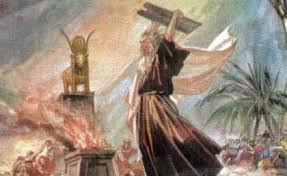It is the Sound of Singing that I Hear
32: 15-20
It is the sound of singing that I hear DIG: How was Moses equipped to handle what he finds at the foot of the mountain? What is his frame of mind? What trips his anger? What had the rebellion accomplished? What was the purpose of forcing the rebellious Israelites to drink the gold dust?
REFLECT: Do you destroy things when you get angry? Do you throw things? How did Yeshua act when he got angry? What do you think is the appropriate way to express your anger? How can you act in an appropriate way when others get angry with you? What do our rebellions against God accomplish?
Following his intercession Moses turned and went down the mountain with the two tablets of the Ten Commandments in his hands. They were inscribed on both sides, front and back. The tablets were the work of God; the writing was the writing of God, engraved on the tablets (32:15-16). In ancient times two copies of every suzerainty treaty (one for the suzerain and one for the vassal) were always made, and each copy contained the text of the entire treaty. We assume, therefore, that each of the two stone tablets contained all of the Ten Commandments. One of the copies belonged to the covenant-making God (the Suzerain), the other to His covenant people, Isra’el (the vassals). Both were deposited in the Ark of the Covenant (25:22). The tablets had been written by God Himself, making the people’s sin against the second Commandment all the more guilty.668
On the way down the mountain Moses met his young aide Joshua, who had been faithfully waiting for him. He thought he heard the sound of war in the camp below. When Joshua heard the noise of the people shouting, he said to Moses, “There is the sound of war in the camp.” There was war in the camp, but not the kind Joshua was thinking of. Moses, however, knew that the noise was evidence of the idolatry called to his attention by God on top of Mount Sinai. Moses concluded: It is not the sound of victory, it is not the sound of defeat; it is the sound of singing that I hear (32:17-18).
The singing and dancing of the Hebrews here ought to remind us of a similar scene after the parting of the Red Sea. In 15:20-21, the Israelites held a great celebration because of God’s great deliverance. And they did so with singing and dancing. Here, when Moses came down the mountain, they were celebrating in the same exact way. But instead of honoring God, they were worshiping a golden calf!669

Moses had successfully soothed God’s wrath, but when he actually saw with his own eyes the depth to which the Israelites had sunk, he did not follow his own advice. When Moses approached the camp and saw the calf and the dancing, his anger burned and he threw the tablets out of his hands in righteous indignation, breaking them to pieces (32:19). This was appropriate and symbolic in the light of the broken covenant between God and Isra’el.670 If they were not prepared to obey the Ten Commandments, they did not deserve to have them.
But even that would not bring a sense of relief to them, as if they were finally rid of the burden of the Ten Commandments. Rather, it shocked them into a clearer understanding of just what it was that they had done. True, they may have been able to imitate portions of their exodus experience, although wholly inadequate, by making the golden bull calf and proclaiming it to be the god of the exodus. They may have used gold to imitate the splendor of the ark and the mercy seat, and they may have appointed Aaron the high priest of their new religion. But one thing they could not duplicate was the Ten Commandments. In fact, their actions were exactly opposite of them. And the smashing of the tablets of stone told them that the party was over. Their attempt to create their own religion had failed.671
Seething, Moses came to the center of the rebellion and took the calf, that was probably wood overlaid with gold, and burned it in the fire. Then he ground the gold to powder, scattered it on the water of a mountain stream (Deuteronomy 9:21) and made the Israelites drink it (32:20). The sin, as it were, was poured into their bodies along with the water to symbolize that they would have to bear the burden of it just as a woman who was suspected of adultery was obligated to drink of the bitter water that brought a curse (Numbers 5:11-31).672 Not much of a god! Instead of being filled with the Spirit, they were filled with gold. This painted a clear picture of the worthlessness of idolatry. If the calf could not save itself, it certainly could not save its worshipers.673
The Psalmist would say it this way: Why do the nations say: Where is their God? Our God is in heaven; He does whatever pleases Him. But their idols are silver and gold, made by the hands of men. They have mouths, but cannot speak, eyes, but they cannot see; they have ears, but cannot hear, noses, but they cannot smell; they have hands, but cannot feel, feet, but they cannot walk; nor can they utter a sound with their throats. Those who make them will be like them, and so will all who trust in them. O house of Isra’el, trust in God. He is our help and our shield (Psalm 115:2-9). The idols of today are just as worthless as they were in Moses’ day. And just as surely as God was the Israelites help and shield then, He is our help and shield today.



Leave A Comment